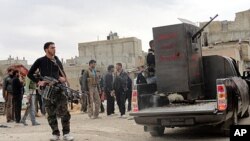Syrian security forces have launched a ground assault on the besieged city of Homs, in an attempt to overrun rebel-held districts that have endured nearly a month of bombardment.
Activists said Wednesday that elite Fourth Armored Division units under the command of President Bashar al-Assad's brother, Maher, were engaged in pitched battles with the rebel Free Syrian Army just outside the opposition Baba Amr and al-Inshaat neighborhoods.
A Syrian official vowed Baba Amr would be "cleansed" within hours. But an activist in the district told VOA via Skype that rebel lines have held.
The activist, who uses the pseudonym Abo Emad, said he had witnessed 16 government soldiers and six tank crews defect to the opposition Wednesday morning. He said rebel army sources told him more desertions were taking place as troops enter the city and blend in with the local population.
Abo Emad also said both regular army forces and pro-government Shabiha militia were raiding houses in Homs' wealthy al-Inshaat neighborhood, stealing personal effects and setting fire to the targeted homes.
VOA cannot independently confirm opposition or government reports.
Battles rage
Activist Selim Qabbani told Alhurra TV from Homs that government forces are making small advances in an intense battle.
Qabbani says the Syrian armed forces are attacking the area with rockets, mortar rounds and tank shells. He says that the humanitarian situation in Baba Amr is dire, with casualties numbering in the hundreds and a lack of medical supplies to treat the wounded.
Activists say that water, electricity and communications have been cut off. They say batteries used to power satellite telephones are running low and that the government is scrambling communications to keep news from reaching outsiders.
Activist Hadi Abdallah told al Arabiya TV from Homs that people are frightened, and that many fear there will be a massacre if there is no international help.
Witnesses in the town of Rastan, north of Homs, say their town is also under siege and being shelled heavily, as conditions deteriorate. Opposition videos showed a number of casualties from the shelling. Rastan is a mainly Sunni Muslim town that once supplied the Syrian Army with many of its officers.
Journalists trapped
At least three Western journalists remain trapped in Baba Amr, although Syrian activists smuggled British photographer Paul Conroy to safety in neighboring Lebanon Tuesday in an escape during which some of his rescuers were killed.
Activists said troops also entered the central town of Halfaya in Hama province after five days of intense shelling. They said the rebel-held town of Rastan, just north of Homs, was shelled and that casualties were reported.
U.N. humanitarian chief Valerie Amos said Syria has turned down her repeated requests to visit the country in order to assess the growing crisis. Diplomats said Damascus has delayed the visit despite efforts by Russia, Mr. Assad's closest international ally, to back Amos.
The move came as Kofi Annan, the newly appointed United Nations-Arab League envoy for Syria, said he will discuss the situation Wednesday with U.N. Secretary-General Ban Ki-moon and member states in New York. He will then go to Cairo for talks with Arab League head Nabil Elaraby.
Syrian Foreign Ministry Spokesman Jihad Makdissi told a press conference in Damascus that the Syrian government has asked the U.N. to provide details about a possible Annan stop in Syria.
The U.N. says more than 7,500 people have been killed in the 11 months of violence. Syrian officials blame the uprising on foreign-backed armed "terrorists" whom the government says have killed more than 2,000 security personnel.
Attacks draw world attention
Analyst Nadim Shehadi of Chatham House in London says that the focus on military operations across Syria has turned the attention of the outside world away from the wider aims of the almost year-old popular protest movement.
"It looks like we are being dragged into following -- minute by minute, hour by hour -- a battle, which will convince us in the end that this is no longer a peaceful protest against the government, but it is a kind of a civil war or a military insurgency, and this in a way is what the Syrian government, what the regime, wants us to believe.”
Shehadi says the Syrian government has been working to turn an anti-government protest into a military conflict because it has "no defense against a non-violent protest movement and refuses to address the core demands of the opposition."
Libya said Wednesday it will donate $100 million in humanitarian assistance to the Syrian opposition and allow them to open an office in Tripoli. Last October, Libya's new government became one of the first countries to recognize the Syrian National Council as the legitimate authority in Syria.

